Healthcare providers make countless decisions every day that directly impact their ability to deliver optimal patient care. Central to this decision-making process is the abundance of health data and patient information.
However, raw data has limited value on its own. Healthcare organizations need professionals who can sift through dense information, investigate trend-based theories, and find meaningful connections across quantitative and qualitative data. Oftentimes these qualities are found in healthcare data analysts.
If this career path interests you, here’s an overview of what a healthcare data analyst is and the steps you need to take to start a career in this exciting field in healthcare.
Ready to apply? Request an application fee waiver
What Is a Healthcare Data Analyst?
Healthcare data analysts help organizations make better-informed decisions about patient care, public health, business operations, resource allocation, and cost efficiency. By monitoring vast datasets, analysts can identify disease patterns and predict emerging trends so organizations can develop effective strategies to improve healthcare systems.
“A healthcare data analyst is someone who understands healthcare data from multiple kinds of organizations—whether it’s a hospital, a health plan, pharmaceutical companies, retail pharmacies, or rehab facilities,” says Craig Johnson, a part-time lecturer at Northeastern’s Khoury College of Computer Sciences and Chief Science and Technology Officer at Decision Point Healthcare. “They have to be able to understand the business, mine the data that’s available, create key performance indicators, and identify interesting trends that are relevant to improving patient care.”
Some typical job responsibilities of a healthcare data analyst include:
- Managing and organizing healthcare data: To derive useful insights, analysts have to organize and process data in ways that align with the problems they want to solve.
- Investigating data to find patterns and trends: Analysts use databases and machine learning to study the factors driving a health trend.
- Interpreting data to provide relevant and accurate reports: Tools like visualization and predictive modeling help analysts understand healthcare trends and translate this information into meaningful insights.
- Understanding healthcare business operations: Knowledge of business processes and performance metrics allows analysts to identify ways to improve efficiency, care delivery, and cost.
- Providing recommendations for improvement: Analysts aid organizational goals by assessing what is or isn’t working and recommending productive changes.
With such a pivotal role in the preventative sector of healthcare, prospective healthcare data analysts can expect a stable job market that provides both job security and an abundance of professional opportunities.
According to our analysis of job postings data, healthcare data analyst jobs are expected to grow 15 percent in 2024—much higher than the national average.
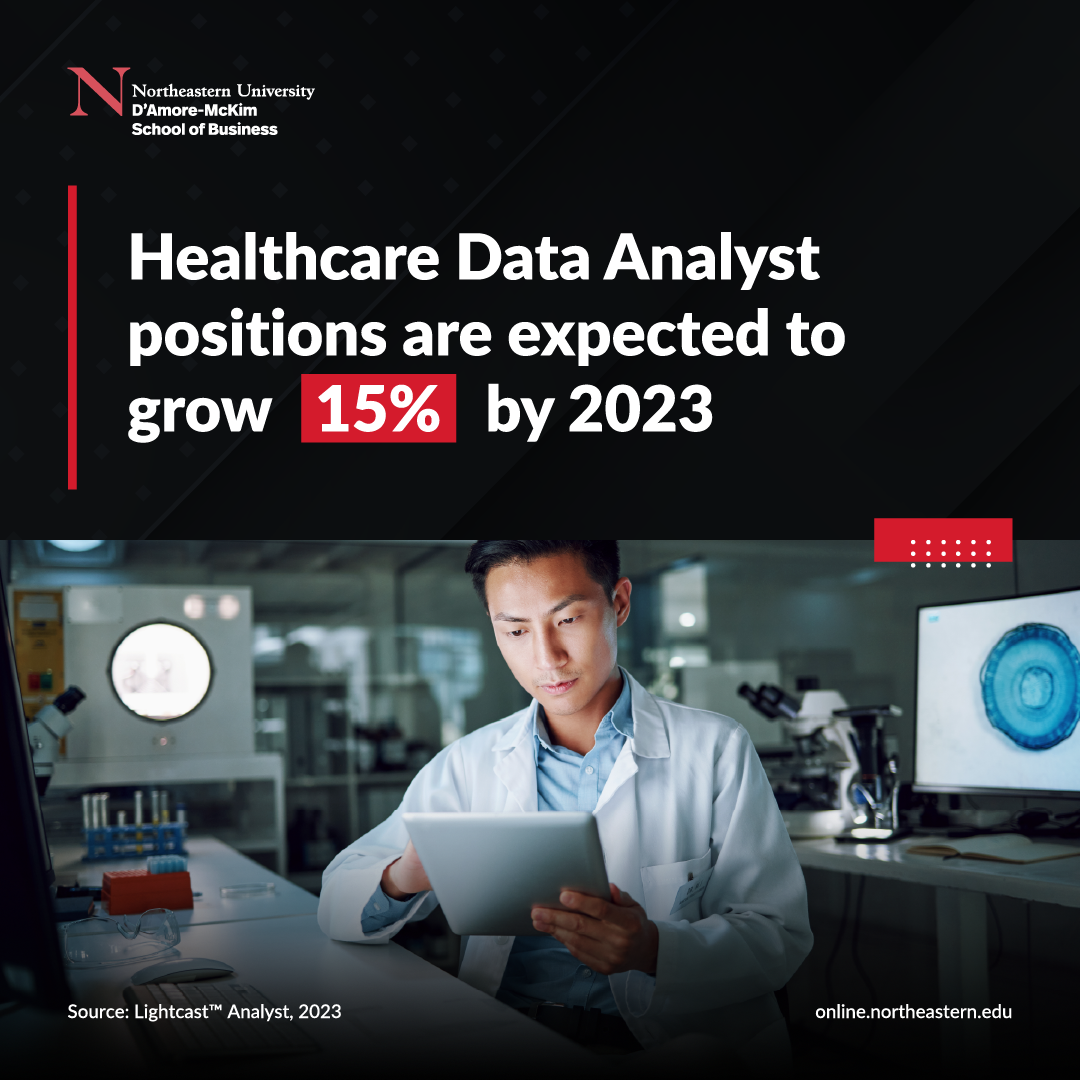
“There’s a lot of sustainability and a lot of opportunity in a career as a healthcare data analyst,” Johnson adds.
In addition, healthcare data analysts can expect high earning potential as well. According to the same job postings data, healthcare data analysts make a median salary of $92,400 in the United States
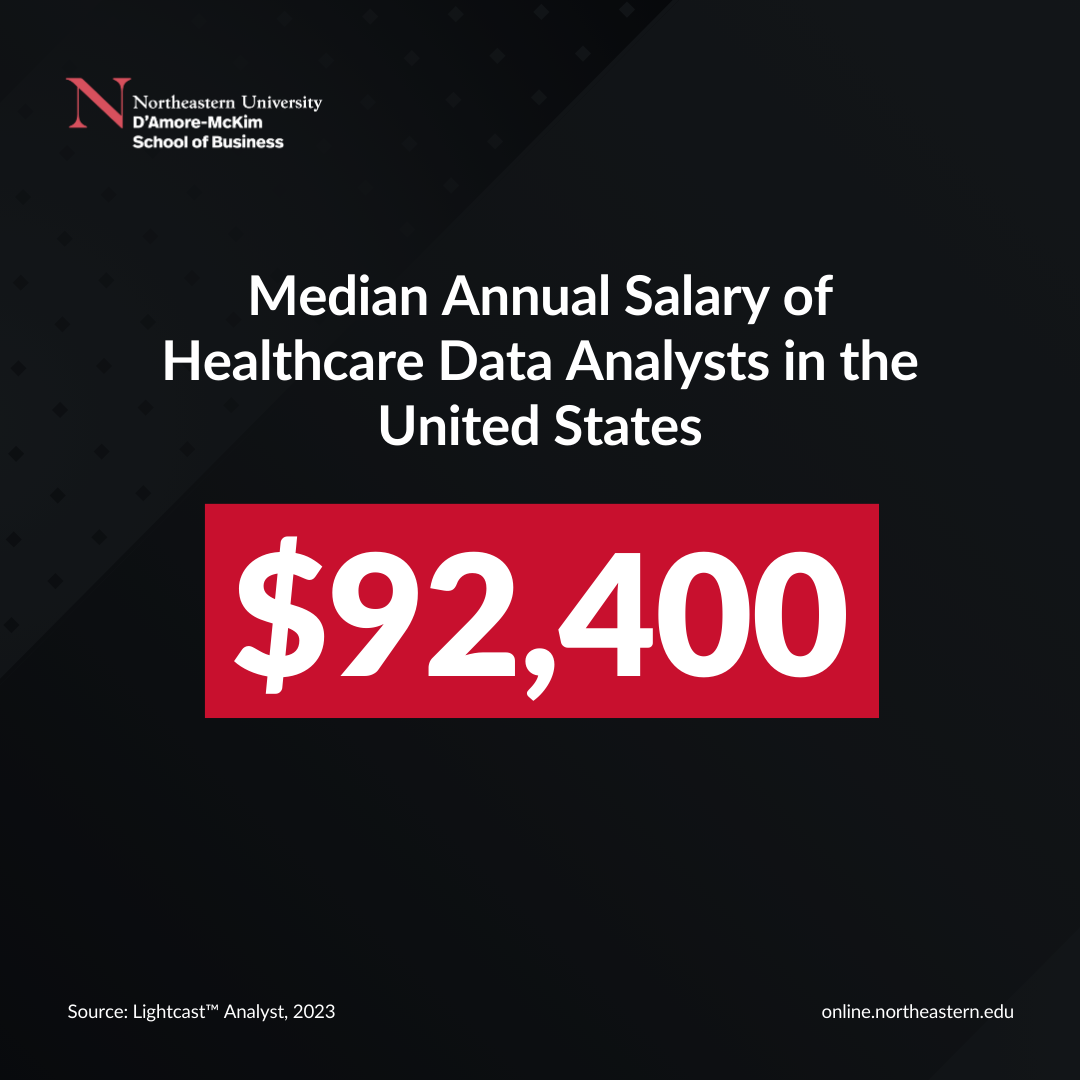
With so many benefits, becoming a healthcare data analyst is an excellent choice for business professionals who want to make an impact on peoples’ lives. Plus, the healthcare analytics field has multiple paths of entry—making it possible to build upon your previous experience.
So whether you’re transitioning industries or just starting your career, here are four steps to becoming a healthcare data analyst.
4 Steps to Becoming a Healthcare Data Analyst
1. Earn the Right Degree
Getting the right education is the first step to starting a healthcare analytics career. Analysts need working knowledge of business processes, databases, and health sciences to effectively evaluate data. The most common educational pathways into the field are computer science, information technology, data analytics, and healthcare management programs.
While professionals with this kind of educational background are better prepared for the evolving field of analytics, it’s also important to consider what level of education will make you more marketable.
According to our analysis of job postings data, 82 percent of healthcare analyst jobs require a bachelor’s degree, while 35 percent require a master’s degree and 4 percent require a PhD.
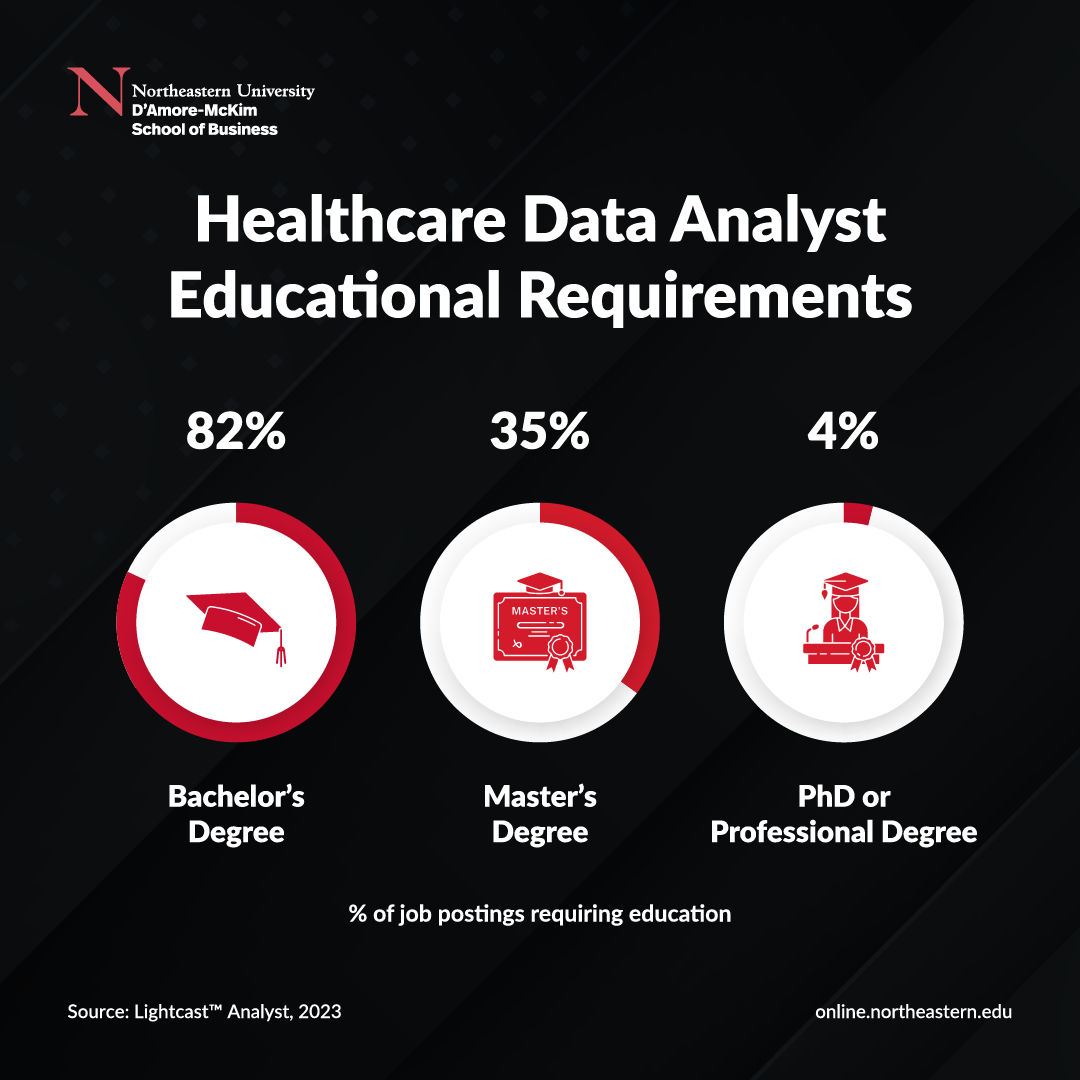
This means earning a master’s degree can make you more appealing to employers. In addition, healthcare analytics is likely to become more competitive over time, making it beneficial to pursue a specialized or multidisciplinary degree program that will prepare you to advance to higher positions.
2. Acquire the Right Skills
Developing a specialized skill set is an excellent way to prepare you for the various responsibilities of a healthcare data analyst. While there are several valuable competencies, according to our analysis of job postings data the top specialized skills employers look for include:
- Data analysis: Analysis involves evaluating different sets of information to uncover patterns, trends, and insights that aid in decision-making.
- SQL: Knowledge of Structured Query Language (SQL) allows analysts to manage databases and perform data retrieval tasks.
- Statistics: By collecting, interpreting, and presenting relevant data sets, statistics professionals can draw reliable conclusions and predict future outcomes.
- Business intelligence: Analyzing industry and organizational data enables leaders to make strategic decisions to drive innovation, foster growth, and solve problems.
- Data management: Data management involves organizing, storing, and maintaining data throughout its lifecycle to ensure accuracy, security, and accessibility.
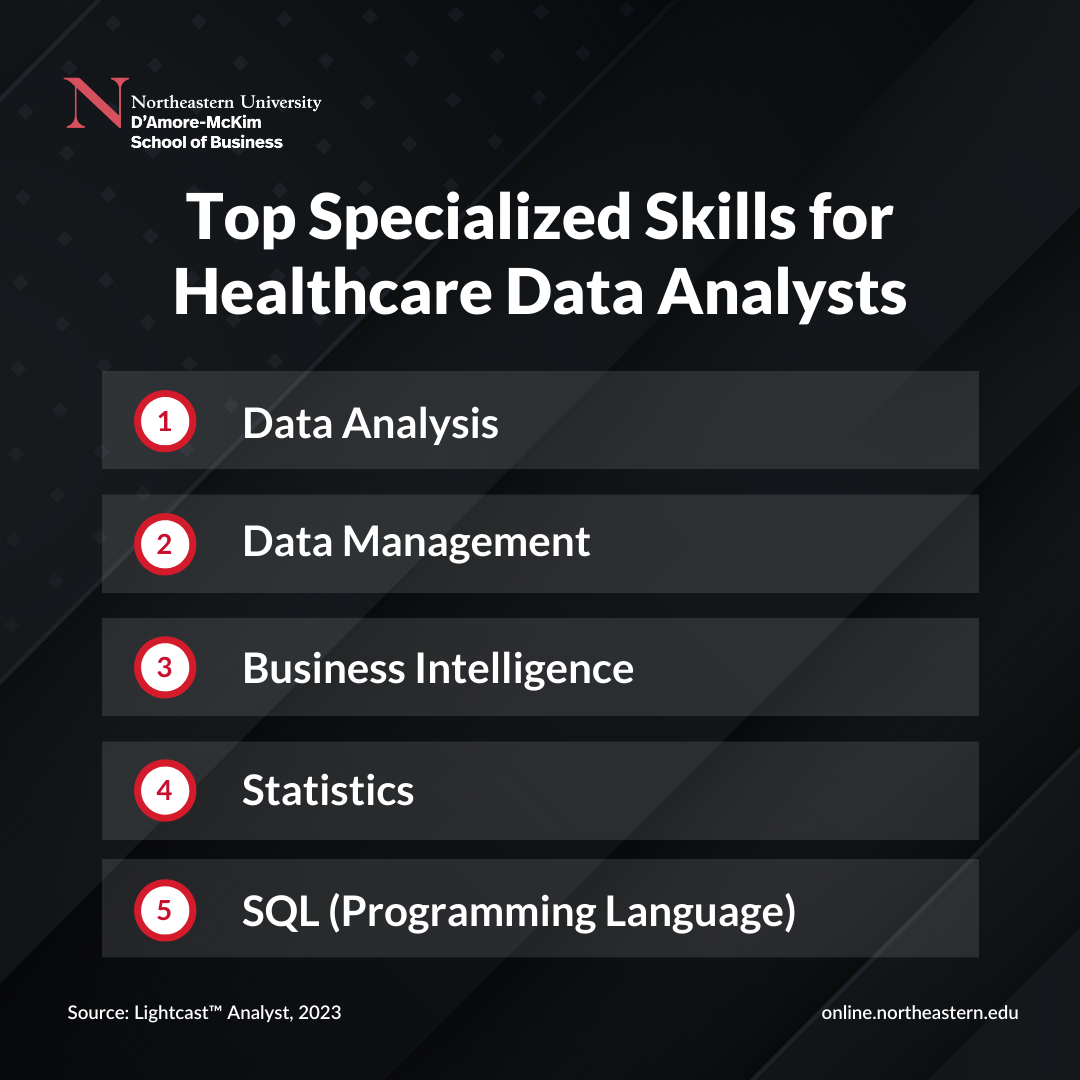
While technical skills are essential to your success in healthcare analytics, common competencies ensure you can thrive as a business professional in setting. According to the same job postings data the top common skills for healthcare data analysts are:
- Mathematics: The ability to evaluate, calculate, and configure numerical data is essential to solve organizational challenges.
- Communications: Analysts must be able to convey complex technical information to a variety of stakeholders and communicate the benefits of implementing specific recommendations.
- Leadership: Data analysts who plan to pursue higher roles must have the competency to lead teams, foster collaboration, and align data applications to organizational goals.
- Research: Research provides the contextual framework for data analysis, ensuring that data processes are based on diverse, highly relevant information.
- Problem Solving: Problem-solving skills are necessary to manage intricate datasets and design analytics processes and techniques that successfully address business challenges.
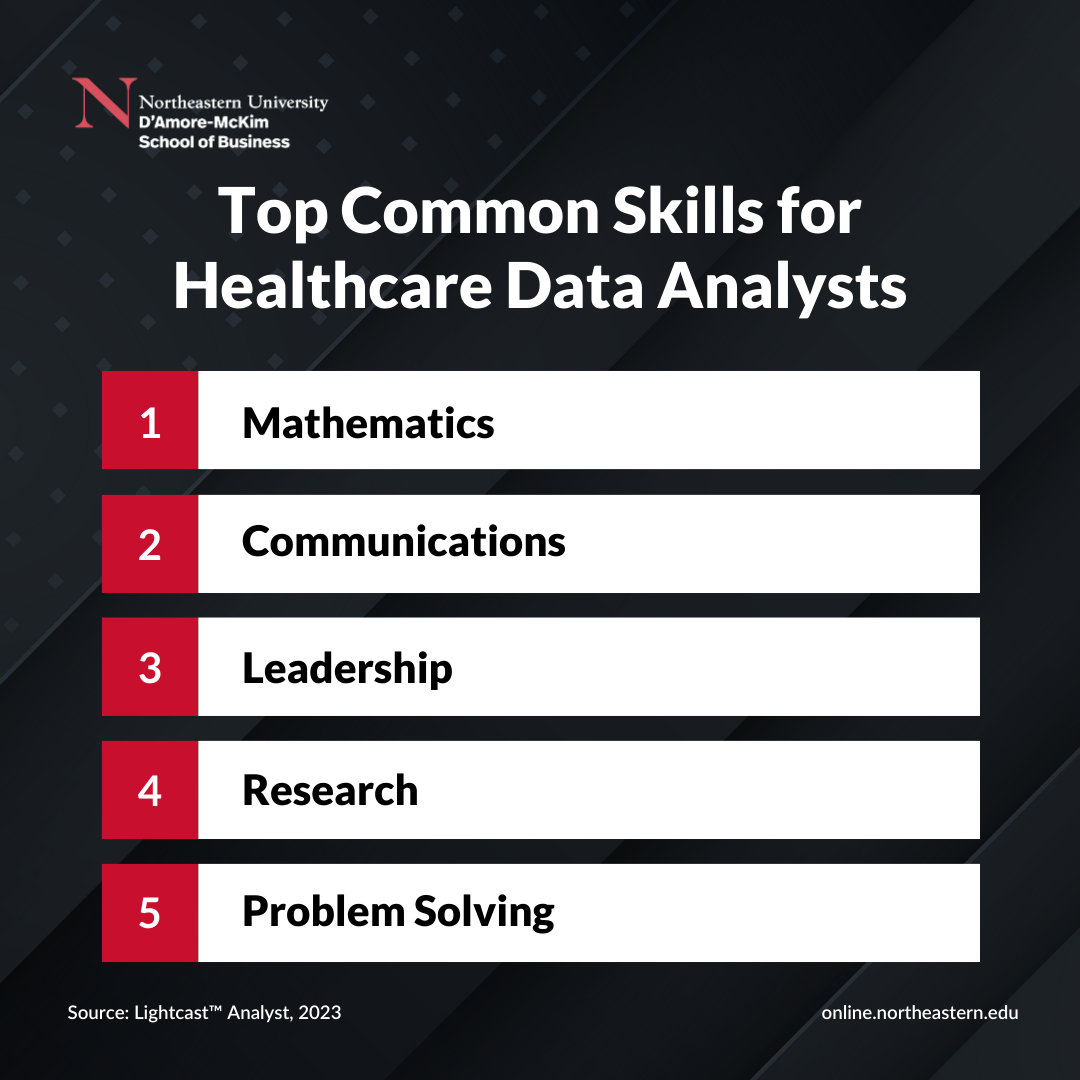
If you want to build a strong foundation for a healthcare analytics career, Northeastern’s OMSM: Digital Transformation program is an excellent degree option. The program equips students with both the technical skills and business knowledge to understand the healthcare data landscape and how to leverage technological innovations.
3. Gain Experience
Since healthcare analytics is constantly evolving as technology changes, your work experience is crucial to your long-term success in the role. However, this experience doesn’t have to be in the technology space to provide value to your future career.
Many healthcare data analysts come from a technology or business background and want to enter the healthcare industry. Others are mid-level healthcare professionals looking to advance their technical skills.
Depending on your background, it’s essential to fill in the gaps in your knowledge and expand your frame of reference with hands-on experience. This is particularly important considering the job postings data trends of the healthcare analytics industry.
For example, data shows that the average experience requirements for healthcare data analyst job postings is two to three years. This level of experience accounts for 33 percent of total job postings. While 24 percent have almost no years of experience requirements, 35 percent ask for applicants with four to six years.
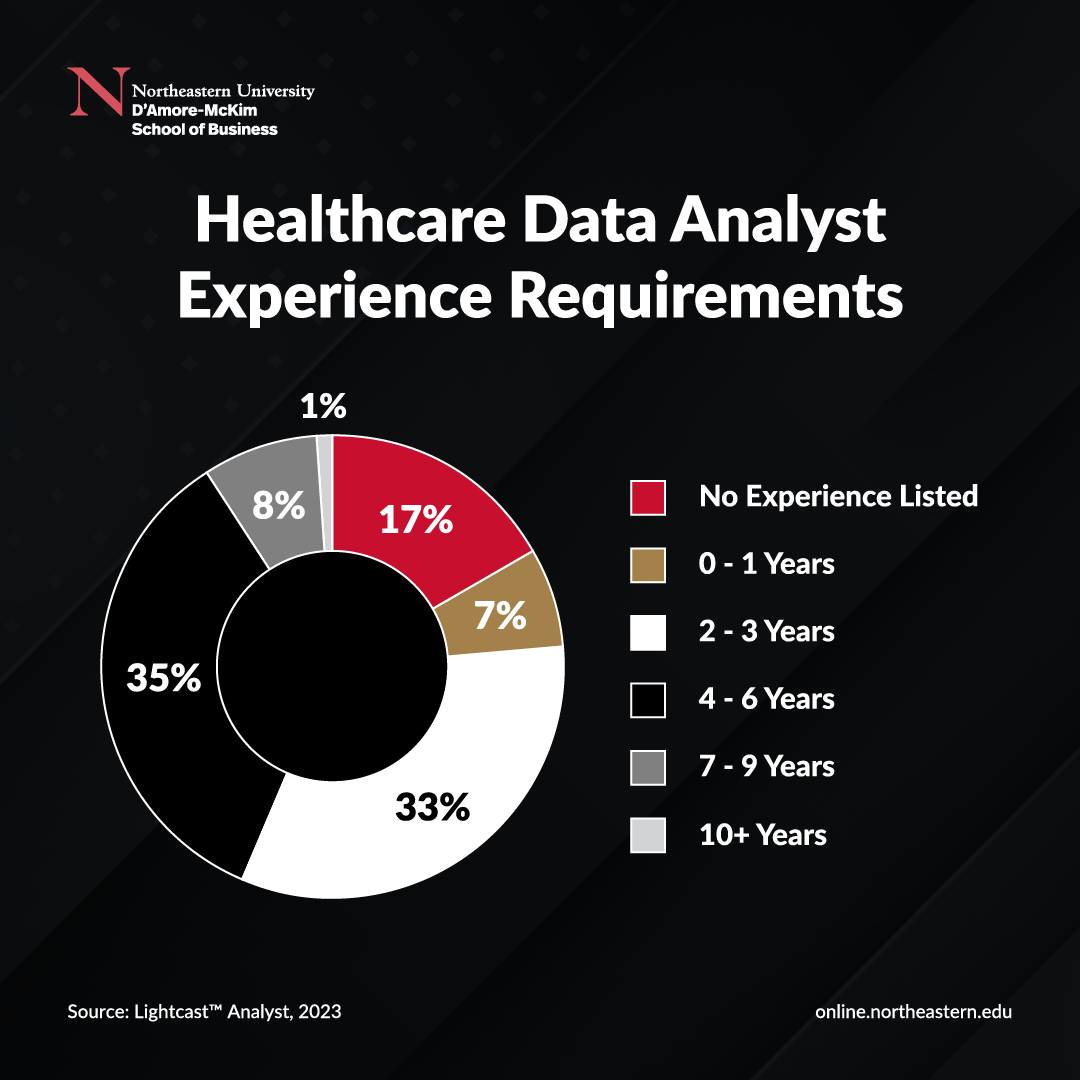
Internships and experiential degree programs, like the one offered at Northeastern, are great ways to enrich your knowledge and expertise and help you fill the gaps in your resume. It gives you the opportunity to work in business, public health, and patient care settings.
4. Earn a Certification
While certifications aren’t typically required for healthcare data analyst jobs, they can help make you a more competitive candidate for certain roles.
For example, HITRUST certifications are highly valued for data security and compliance because they demonstrate advanced knowledge of regulatory practices and protected healthcare information.
Earning specialized certifications in an area of interest can help you set yourself apart from others as someone who is dedicated to professional development and advancement.
Take the Next Step in Your Healthcare Analytics Career
Specialized programs for healthcare management provide a direct pathway into this fast-growing career. These programs focus on the collaboration between technology, analytics, public outreach, and the health sciences. In addition, it opens you up to valuable networking opportunities within the industry.
“Talking to people that are in the field, learning through networking is one of the best ways to determine if a career in healthcare data analytics is right for you,” Johnson concludes.
If you’re interested in pursuing a graduate education, consider earning a healthcare analytics masters degree from Northeastern University. The Online MS in Management with a Digital Transformation in Healthcare concentration prepares graduates to be mission-driven thinkers who can help their organizations deliver value-based care to patients.
If you want to Learn more about what this degree can do to help your career. Connect with an admissions counselor to find out what the program has to offer.





